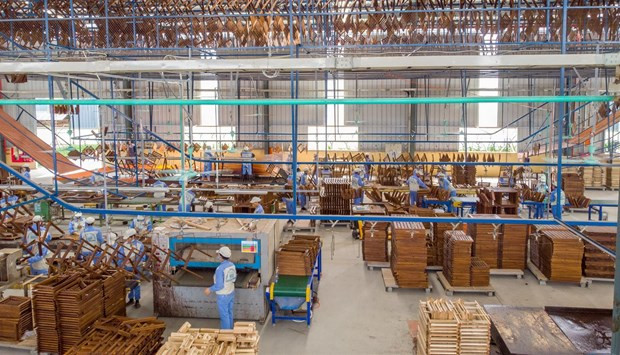
In the first half of this year, the export value of these products reached over 6.06 billion USD, marking a year-on-year decrease of 27.8%. However, the export value in the second quarter increased by 15% compared to the first quarter.
The export value of wood and wooden products was estimated at nearly 1.1 billion USD in July, bringing the industry's total export earnings in the first seven months of this year to 7.1 billion USD, down 25% year on year, according to data from the Ministry of Agriculture and Rural Development.
But the export value exceeded 1 billion USD in July after falling for months, revealing positive signals in the industry’s recovery.
According to DSC, forest fires in Canada greatly affected the supply of timber in North America in the short term. Many wood factories had to close temporarily. The supply disruption helped wood prices to recover.
Meanwhile, early this year, the impact of policy, inflation and global economic slowdown, especially in the US and EU – two key importers of Vietnamese products, caused a sharp decrease in export turnover of goods in general and wooded products in particular.
From the second quarter of 2022, the US’s tightening monetary policies, high interest rates of loans for house purchases caused sales of ready-built homes in the US to decline continuously. Families also tend to limit and cut spending, especially for non-urgent items such as new furniture or kitchen tables.
However, DSC believed that the trend may reverse in the fourth quarter of 2023 because the interest rates are more stable and the US economy is more stable than expected. In fact, US ready-built home sales have escaped sharp declines since February 2023.
The recovery signal not only appeared in the ready-built housing segment. The market for new houses in the US also showed clear signs of recovery. After a decline from April 2022, the number of new homes built in the US has recovered significantly.
In May and June 2023, the real estate market in the US started construction of 1.56 million units and 1.43 million units respectively, while January saw the construction of just 1.3 million units. The current demand for new housing construction is still higher than the pre-COVID-19 period in 2020.
Thus, the US housing market stands firmer than many investors expected, especially when US interest rates are still anchored at high levels.
Insiders said that as the US economy begins to stabilise and construction needs begin to rise again in the second half of the year, the consumption of wooded products is likely to improve.
A survey of the Handicraft and Wood Industry Association of Ho Chi Minh City showed that orders that the industry received dropped by an average 30% in the recent past, but more orders returned in July ahead of the year-end shopping season.
Chairman of Global Integration Business Consultants (GIBC) Pham Phu Ngoc Trai said that the reduction in orders of the wood industry is only temporary.
The rise to over 1 billion USD in July export revenue after a steep decline for quite some time is a sign that the industry is recovering gradually.
The wood processing industry in Vietnam has maintained a double-digit growth of 15.4% for many years, placing the country in the top five biggest furniture exporters in the world.
The wood and forest product industry set the goal for export value of 17.5 billion USD this year, a slight increase over 2022, which was at 17.1 billion USD, which could be challenging as global consumption demand declines./.VNA